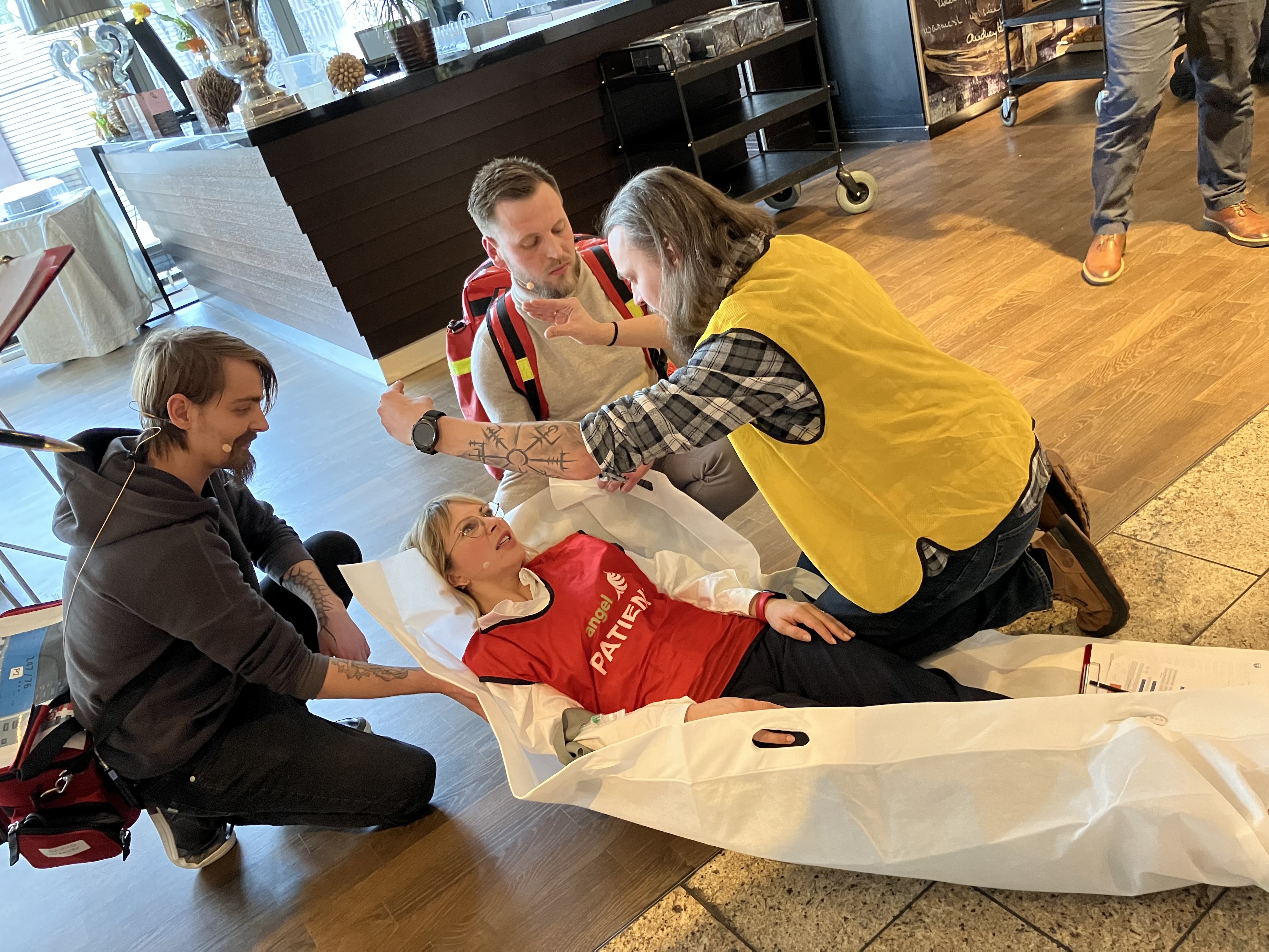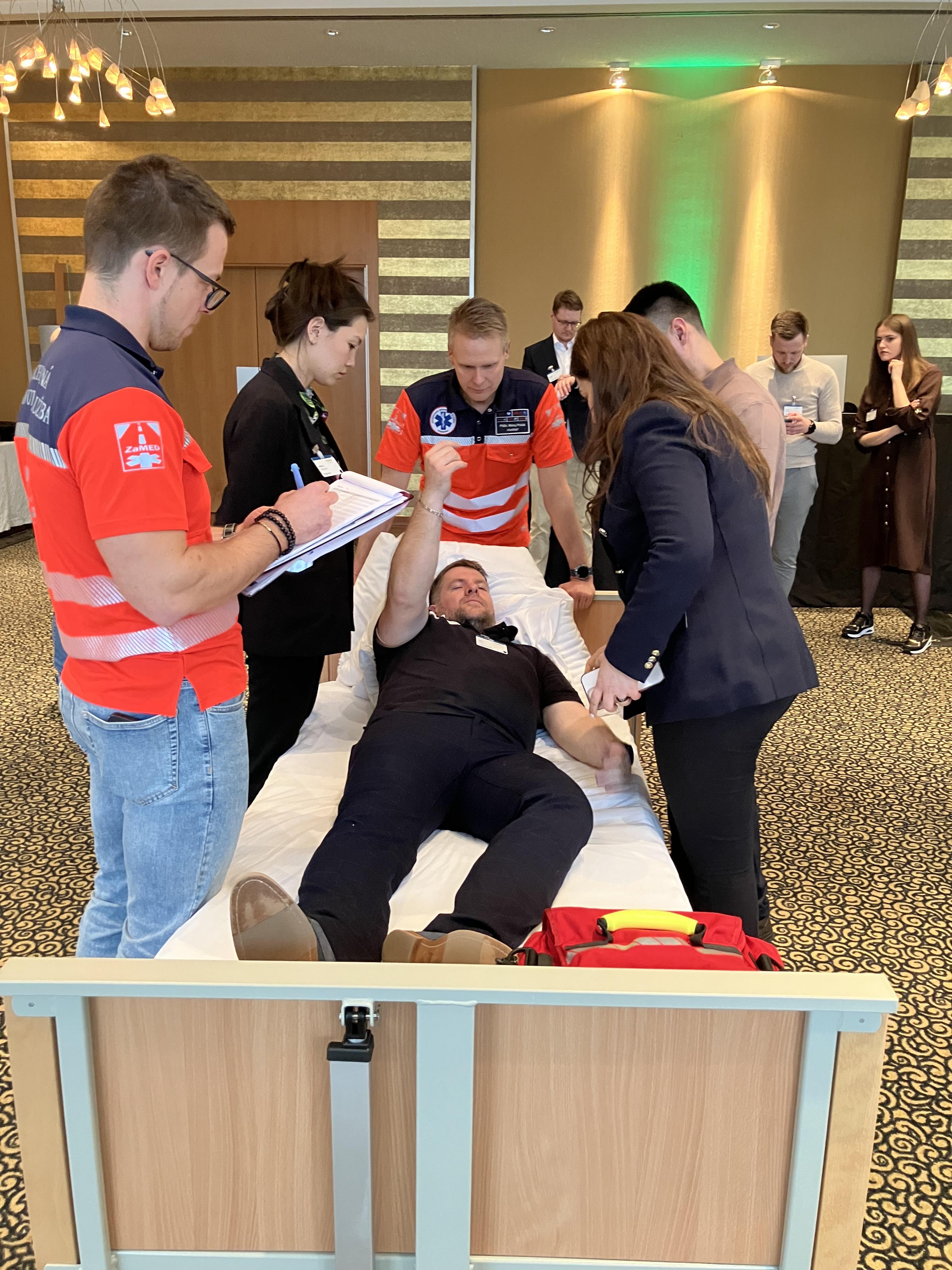
Chỉ riêng ngày đầu tiên đã có hàng tá bệnh nhân.
Họ bao gồm một phụ nữ trẻ đã đánh rơi một tách trà sau khi cánh tay bị tê, một bệnh nhân bị liệt nửa người nhẹ, một người khác bị liệt nửa người phải và mất ngôn ngữ, và một người bị run được phát hiện là do đau lưng.
Tiếp theo, Petr Jaššo, giám đốc giáo dục EMS cho Khu vực Moravian Silesian ở Ostrava, Cộng hòa Séc, đã tiết lộ một món quà cho hiệu suất bằng cách chơi, trong số những người khác, một bệnh nhân say rượu, người sẽ trở thành một người giống đột quỵ, một bệnh nhân bị động kinh và một bệnh nhân từ nhà hưu trí có điểm số trước đó cho thấy một khuyết tật đã có từ trước.
Bối cảnh là một sự kiện Đào Đào tạo người huấn luyện ở Mainz, Đức, và đó là một cột mốc quan trọng. Đây là lần thứ hai mươi nhóm cốt lõi của Angels Initiative đã mời các chuyên gia chăm sóc sức khỏe từ khắp châu Âu đến hai ngày đào tạo chuyên sâu về chăm sóc đột quỵ – một khái niệm giáo dục về đột quỵ lần đầu tiên được đưa vào thử nghiệm vào tháng 12 năm 2017 tại Wiesbaden, và sau đó đã được nhân rộng trên toàn thế giới.
Các sự kiện đào tạo huấn luyện viên là nền tảng của chương trình giáo dục Angels. Chúng được tổ chức đều đặn ở một vị trí trung tâm nơi các bác sĩ thần kinh tham dự hai ngày đào tạo chuyên sâu. Các bác sĩ đã hoàn thành khóa đào tạo được khuyến khích sử dụng các slide Angels và tài nguyên học tập cho các bài thuyết trình và hội thảo đào tạo của riêng họ tại các bệnh viện và khu vực của họ. Một lợi thế chính của định dạng này là nó mở rộng quy mô cung cấp đào tạo theo cách hiệu quả về chi phí trong khi vẫn duy trì tính nhất quán, nhưng các sự kiện Angels Đào tạo người huấn luyện đã hoàn thành nhiều hơn nữa. Họ đã cung cấp một nền tảng cho những điểm sáng trong chăm sóc đột quỵ từ khắp châu Âu, và họ đã phát triển và củng cố Cộng đồng Angels, tạo ra một nhóm các chuyên gia ngày càng mở rộng thống nhất trong cuộc chiến chống lại đột quỵ.

Gió thay đổi
Trưởng nhóm cốt lõi Rita Rodrigues và quản lý dự án Madeline Bucher, người chủ yếu chịu trách nhiệm tổ chức sự kiện, cho biết chương Đào tạo người huấn luyện luyện viên (TTT) gần đây nhất có một chút khác biệt. Trước đây, chương trình nghị sự chủ yếu được thiết kế cho các bác sĩ thần kinh, nhưng sau khi tham khảo ý kiến của các điều phối viên quốc gia ở vùng Baltic và Balkan, họ đã quyết định mở rộng sự kiện sang các dịch vụ y tế khẩn cấp. Kết quả là, 20 cặp người tham dự từ 10 quốc gia đã được đề cử cho sự kiện này, mỗi cặp bao gồm một nhà thần kinh học và chuyên gia EMS từ cùng một khu vực. Kỳ vọng là điều này sẽ ảnh hưởng tích cực đến hiệu suất khu vực, vì sự hợp tác giữa các bệnh viện và EMS là nguyên lý trung tâm của chiến lược 100 Khu vực Thiên thần.
Điều này, dù quan trọng đến đâu, cũng không phải là điều duy nhất phân biệt sự kiện này với những sự kiện trước đó.
10 quốc gia đã cử đại biểu đến Mainz bao gồm một người mới đến và một sự trở lại. Bosnia & Herzegovina đã tham dự lần đầu tiên, và Serbia đã trở lại sau vài năm vắng mặt, nhờ công việc của cố vấn Angels Maria Sheverdina trong lãnh thổ. Cũng được đại diện làArmenia,Croatia, Estonia, Latvia, Lithuania, Bắc Macedonia,Kazakhstan và Kyrgyzstan.
Tất cả những người tham gia đã được thiết lập một khóa học tại Học viện Angels trước sự kiện – “Tối ưu hóa Lộ trình Siêu cấp tính” cho những người tham gia bệnh viện, và cho EMS, “Hỗ trợ Cuộc sống về Đột quỵ Nâng cao cho các Nhà cung cấp Dịch vụ Tiền viện”. Sau khi hoàn thành khóa học trực tuyến ASLS tại Học viện, những người tham gia EMS có thể mong đợi hướng dẫn thực hành của Petr Jaššo và Matej Polák và Patrik Brna của ZaMED đã giành được nhiều giải thưởng. Sau đó vào ngày đầu tiên, Matej và Patrik sẽ điều tiết và ghi điểm các màn trình diễn trong Cup Mô phỏng Đột quỵ đầu tiên cho EMS, với Petr mang lại một số tính thực tế cho mô phỏng bệnh nhân, và các đội từ Latvia và Lithuania chia sẻ chiến lợi phẩm.
Một kế hoạch kết hợp với nhau
Vào ngày thứ hai, có nhiều bệnh nhân hơn, bắt đầu với khóa đào tạo NIHSS của Tiến sĩ Elena Terecoasa từ Romania, và một phiên họp về Giám sát Chất lượng trong đó các chuyên gia tư vấn Lev Prystipiuk và Maria Sheverdina và trưởng nhóm dự án Silvia Ripaponti Angels dẫn dắt dự án Belén Velázquez đưa ra lời khuyên thiết thực để thu thập dữ liệu trở thành một phần của thực hành hàng ngày, thu thập dữ liệu trên RES-Q và sử dụng phân tích dữ liệu để cải thiện hiệu suất.
Vào buổi chiều, tư vấn viên mới của Angels, Federica di Fonzo từ Ý, tham dự TTT đầu tiên của cô, đã mặc áo khoác bệnh nhân màu đỏ cho lần đầu tiên trong hai mô phỏng luôn kết thúc chương trình nghị sự, dựa trên kiến thức thu được trong quá trình diễn ra sự kiện.
Các mô phỏng được hướng dẫn bởi các chuyên gia và phát sóng đến phòng toàn thể chính, nơi năm nay việc bổ sung một nhà điều hành máy ảnh lưu động đã giúp khán giả theo dõi các thủ tục tố tụng chi tiết hơn. Tuy nhiên, sự khác biệt chính là những kịch bản này bao gồm giai đoạn trước khi nhập viện. Hành động này bắt đầu tại nhà của bệnh nhân, nơi "Patricia" 30 tuổi đã ngã trong phòng tắm sau khi phàn nàn về đau đầu nhẹ trong vài giờ. Khi tình trạng yếu chân trái đột ngột khiến Patricia/Federica phải đi vệ sinh, bạn cùng phòng của cô đã gọi 112 để được giúp đỡ.
Mặc dù họ rõ ràng lo lắng và căng thẳng, các nhóm mô phỏng vẫn hoạt động khá tốt, Madeline báo cáo. Các cuộc phỏng vấn và thảo luận chi tiết sau đó đóng vai trò là sự củng cố học tập cho toàn bộ nhóm, cải thiện việc lưu giữ kiến thức và cuối cùng dẫn đến những thay đổi hành vi bền vững.
Đối với những thay đổi được giới thiệu vào ngày kỷ niệm 20 năm TTT, mặc dù ban đầu họ lo lắng, Rita và Madeline vẫn lạc quan về kết quả.
Việc tập hợp các bệnh viện và EMS lại với nhau theo định dạng đào tạo này thúc đẩy mối quan hệ giữa các nhóm trước khi nhập viện và các nhóm siêu cấp tính, họ nói. Nó xây dựng các mạng lưới dẫn đến các con đường nâng cao và cuối cùng là cứu mạng sống.

